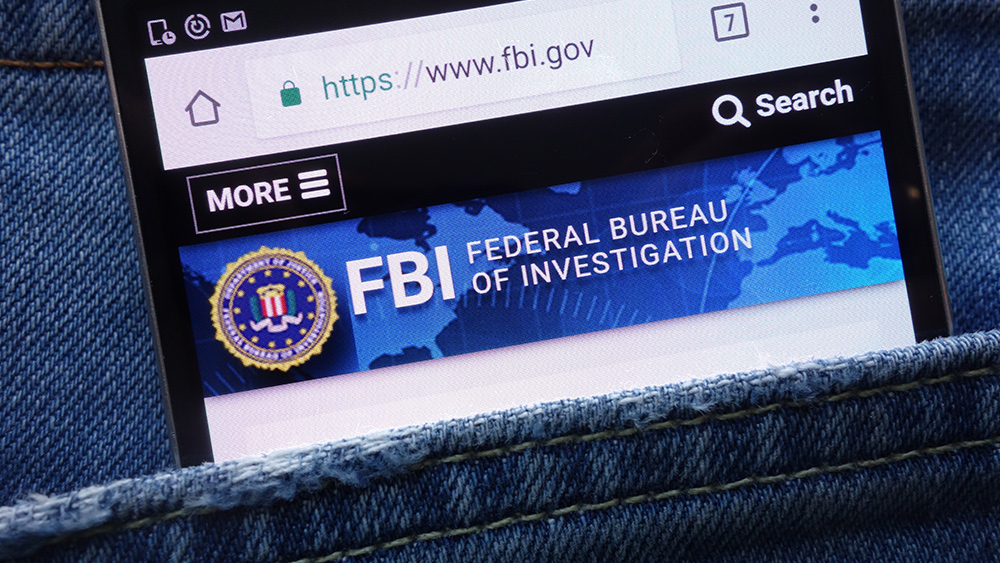FDA’s ‘Rumor Control’ hub encourages public to SNITCH on ‘misinformation spreaders’
06/09/2023 / By News Editors

The U.S. Food and Drug Administration launched an updated “Rumor Control” hub aimed at enlisting the public to help stop the spread of “misinformation,” which the agency defined as “false, inaccurate, or misleading … spreading intentionally and unintentionally.”
(Article by Brenda Baletti, Ph.D. republished from ChildrensHealthDefense.org)
The U.S. Food and Drug Administration (FDA) launched an updated “Rumor Control” hub aimed at enlisting the public to help stop the spread of “misinformation.”
The updated webpage, first launched in August 2022, includes a new video that defines misinformation as information that is “false, inaccurate, or misleading … spreading intentionally and unintentionally.”
The agency said its Rumor Control hub provides the public with tools to identify and report on “misinformation.”
“Some individuals and organizations promote opinions online disguised as fact,” the FDA site says, adding that misinformation spreads “six times faster than facts.”
The video warns that people may be misled by headlines or out-of-context statements, particularly when they are shared by a trusted person.
But, according to the video, people can determine whether something is actually true by getting the information from three types of “authoritative” sources that can be trusted to provide real facts: medical journals, a nonprofit “fact checker” or a government website.
“The FDA is concerned ‘health misinformation’ is negatively impacting the public’s health,” the agency said. The FDA tweeted the video to promote the hub.
What’s the deal with misinformation?
The growing spread of rumors, misinformation and disinformation about science, medicine, and the FDA, is putting patients and consumers at risk. We’re here to provide the facts. https://t.co/JcM10Oq5DYpic.twitter.com/YN79GzwS4Q
— U.S. FDA (@US_FDA) May 16, 2023
The Rumor Control site includes links for reporting misinformation on all major social media sites. By following the links, users can find instructions to mark posts as “false news,” “false information” or “inappropriate content,” depending on the website.
“Bernie’s Tweets” on Twitter called the website the FDA’s “‘snitch’ page.”
US – The FDA has rolled out its ‘snitch’ page. So those following the narrative can snitch to the government about all those who question or disagree with them.
How very erm … pic.twitter.com/01mrpXFXYy
— Bernie’s Tweets (@BernieSpofforth) June 3, 2023
“The federal government continues to try and fool the public into thinking misinformation is a dire problem and a crime,” Dr. Meryl Nass wrote on her Substack. “Misinformation is whatever the government does not want you to know.”
Nass added, “Clearly, the feds are getting nervous that their cons on the people are being recognized.”
The hub provides a poster that explains what misinformation is and how to address it “in language even a third grader can understand,” Nass wrote.
It explains that trusted authorities’ recommendations may change because science changes, but people should always “trust science.”
The site includes FDA-approved facts about COVID-19, sunscreen and supplements.
FDA’s project to ‘save lives’ by policing online content
Since FDA Commissioner Robert Califf began his second tenure as the agency’s head in February 2022, he has made combating “misinformation” one of his top priorities, arguing it is “a leading cause of preventable death in America now” — though “this cannot be proved,” he said.
In an Aug. 22, 2022, article published in the Journal of the American Medical Association, Califf wrote that “the global information environment has been contaminated by misinformation and disinformation.” He added:
“The FDA must be more proactive in preempting and countering misinformation [but there is a need for] collaboration across sectors to create an information environment in which decisions [by] consumers, patients, and clinicians are more likely to be informed by reliable information based on high-quality evidence from trustworthy sources.”
The Rumor Control initiative is one of several such initiatives launched during Califf’s tenure.
For example, the FDA also created a series of fact-checking YouTube videos — “Just a Minute” — that features Dr. Peter Marks, director of the FDA’s Center for Biologics Evaluation and Research, addressing COVID-19 “myths.”
The FDA also uses Twitter to tweet about misinformation, and Instagram to post memes encouraging vaccination.
Califf said that he believes “in the power of social media being used for good,” Fierce Pharma reported.
According to The Associated Press (AP), the FDA also can use a tactic known as “prebunking,” by which the agency defines something as “misinformation” before readers have an opportunity to encounter it elsewhere as possibly true.
The FDA has the ability to do this because Google “prioritizes credible websites” like the FDA’s in its searches.
Rumor Control works as a prebunking strategy that “debunks a long list of false claims about vaccines” and presents them first in people’s Google searches, according to the AP.
Califf previously worked at Verily, a life sciences company owned by Google’s parent company, Alphabet Inc.
Fact-checking the FDA
The most current version of the FDA’s fact check on COVID-19, linked from the Rumor Control hub, assures readers, for example, that vaccination does not make people more susceptible to the latest variants of COVID-19 and that the vaccine is safe for pregnant and breastfeeding women.
But just last week, the Cleveland Clinic published a peer-reviewed study that found the more doses of COVID-19 vaccines a person receives, the higher the risk of getting the virus.
A number of recent studies revealed striking risks to pregnant women who get the COVID-19 vaccine and identified serious flaws in the methods government agencies used to conclude they are safe.
Government health officials knew about several of those studies, including Pfizer’s own clinical trial studies, before they recommended the shots for pregnant women.
The FDA also came under fire for granting Emergency Use Authorization for the COVID-19 vaccine for children ages 12-15 despite having identified that “safety signals” existed for myocarditis in young males following COVID-19 jabs.
The FDA, along with the Centers for Disease Control and Prevention, withheld this information from the public.
In the last two years, the FDA also was widely criticized for granting approval to an unproven Alzheimer’s drug, for its delayed response to a contaminated baby formula plant and for approving the respiratory syncytial virus vaccine for pregnant women despite concerns about premature births identified in clinical trials, among many other issues.
Nass wrote that in 1992, Congress passed the Prescription Drug User Fee Act, which allowed the FDA to charge manufacturers to regulate their products, compromising its integrity to such an extent that the FDA has become “a rogue agency for hire.”
Most funding the FDA uses to evaluate whether drugs are safe and effective comes from industry, she wrote, and most drugs seeking approval get fast-tracked and evaluated in just six months.
Manufacturers of drugs that are dangerous can often avoid liability by working with the FDA to write the label in such a way that meets disclosure requirements.
“So if you are looking to avoid misinformation, the FDA is the last place you might go to for truth, honesty, ethics and consideration of the public’s welfare,” Nass wrote.
Read more at: ChildrensHealthDefense.org
Submit a correction >>
Tagged Under:
big government, Big Pharma, conspiracy, corruption, cyber war, deception, disinfo, fascism, FDA, Glitch, misinformation, pharmaceutical fraud, precrime, Rumor Control hub, speech police, thought crimes, thought police, Tyranny, vaccine wars, vaccines
This article may contain statements that reflect the opinion of the author
RECENT NEWS & ARTICLES
COPYRIGHT © 2018 PRECRIMES.NEWS
All content posted on this site is protected under Free Speech. Precrimes.news is not responsible for content written by contributing authors. The information on this site is provided for educational and entertainment purposes only. It is not intended as a substitute for professional advice of any kind. Precrimes.news assumes no responsibility for the use or misuse of this material. All trademarks, registered trademarks and service marks mentioned on this site are the property of their respective owners.




















